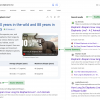Salesforce, a cloud-based CRM platform, has earned an overall rating of 4.07 out of 5. Pricing starts at $25 per user per month, billed annually. Its key features include contact management, opportunity management, quote management, Einstein AI, and mobility. Salesforce offers a 30-day free trial for interested users.
Salesforce is a leading CRM platform that helps businesses manage sales, marketing, and customer interactions. It offers a wide range of products, data analytics, and automation capabilities that enable businesses to capture leads, nurture relationships, close deals, and analyze data for future strategies. Its versatility and extensive feature catalog make it a compelling choice for businesses of all sizes, from small startups to large enterprises. It offers packages suitable for different business needs, including industry-specific solutions for sectors like healthcare, energy, and financial services. Salesforce’s cloud-based platform and mobile app make it ideal for remote or on-the-go teams and data-driven organizations.
Salesforce CRM pricing ranges from $25 to $500 per user monthly for its Sales Cloud products. It offers five editions, including Starter Suite, Pro Suite, Enterprise, Unlimited, and Einstein 1 Sales. The basic plan includes essential CRM features, while higher tiers offer advanced features like sales forecasting, lead scoring, and an AI-powered assistant. Salesforce also offers a 30-day free trial for users to explore their options before making a purchase decision.
Key features of Salesforce include contact management, opportunity management, quote management, Einstein AI, and mobility. Contact management provides a holistic view of customer interactions, while opportunity management helps strategize the next steps in deals. Quote management simplifies the quoting process, and Einstein AI offers flexible, predictive, and generative AI tools. Mobility allows users to access CRM data on the go through the Salesforce mobile app.
Salesforce offers customer service through three levels of support under its Success plans. The Standard plan is included in all subscriptions and provides online resources, community support, technical support, and 24/7 phone support for business-stopping issues. Paid Success plans offer priority support, including access to chat and technical support, and a technical account manager. Einstein AI also plays a role in Salesforce’s 24/7 customer support, providing options based on the page the user is on and connecting them to an expert if needed.
While Salesforce offers a comprehensive feature set and CRM product catalog, the extensive range of features and products can make it complex for some users. Its AI and automation features are highly regarded, but it may be expensive for small businesses. Salesforce is a highly scalable and integrable platform but has a steep learning curve for advanced features.
If Salesforce does not meet a business’s needs, alternatives to consider include Pipedrive, Zoho, and HubSpot. Pipedrive focuses on visualizing sales processes, while Zoho offers budget-friendly CRM with essential functionalities. HubSpot combines integrated marketing tools with CRM functionalities. Each alternative has its own strengths and weaknesses, such as pricing, scale, product focus, and flexibility.
In evaluating Salesforce, we considered factors like cost, core features, customizations, advanced features, ease of use, and customer support. The platform has been recognized as the No. 1 CRM in terms of revenue market share worldwide. Its popularity stems from its comprehensive CRM solutions, advanced features, and robust ecosystem of apps. HubSpot ranks higher in terms of usability, but Salesforce surpasses HubSpot in advanced features like reporting and analytics.






